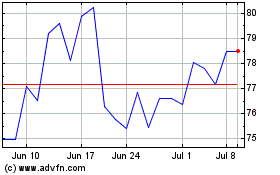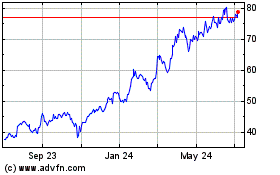By Kosaku Narioka, Takashi Mochizuki and Peter Landers
This article is being republished as part of our daily
reproduction of WSJ.com articles that also appeared in the U.S.
print edition of The Wall Street Journal (July 28, 2017).
TOKYO -- A number of creditors and others involved in Toshiba
Corp.'s restructuring are pushing for a Toshiba bankruptcy filing
as the best path to rebirth after its effort to raise money through
a chip-unit sale stalled.
People involved in talks over Toshiba's workout, including
business partners, lawyers and people with ties to the company's
main bankers, said bankruptcy is worth serious study. Some of them
said it is the best available option and that they are advocating
it in discussions with Toshiba or creditors. They said a bankruptcy
filing by Toshiba, the core of an industrial conglomerate, could
free it of burdens that include lingering liabilities from the
March bankruptcy of its Westinghouse Electric Co. nuclear unit in
the U.S.
Toshiba's chief executive, Satoshi Tsunakawa, said at a recent
news conference that seeking debt relief through the courts isn't
an option. A Toshiba spokesman reiterated this week that the
company has "no specific plan" to seek bankruptcy protection.
A person familiar with deliberations at one of Toshiba's main
lenders compared the conglomerate to a hole that might have
treasure at the bottom but also lurking snakes. Bankruptcy, this
person said, could kill any snakes and let the lenders access the
treasure.
A filing would be among the largest in Japan's history and carry
drawbacks including possible political backlash in the U.S. Toshiba
has committed $3.68 billion to nuclear-plant operator Southern Co.
to cover its Westinghouse-related obligations from an unfinished
project in Georgia. On Thursday, it reached a deal with Scana Corp.
and a partner to pay $2.17 billion to cover obligations on a second
half-completed U.S. nuclear project Westinghouse was building, in
South Carolina.
Japanese government officials and Toshiba executives are aware
of those drawbacks and may be deterred from a bankruptcy filing,
people involved in the discussions said.
Toshiba in June estimated that its liabilities exceeded assets
by more than $5 billion as of March 31. That followed its warning
in April that it had " substantial doubt" about being able to
continue as a going concern because of losses connected to
Westinghouse.
Toshiba has said it plans to recover financial health by selling
its memory-chip business, which has been booming recently thanks to
demand for chips in smartphones and servers. On June 21, Toshiba
designated a consortium led by a Japanese government-backed
investment fund as the preferred bidder for the unit.
But the sale talks have bogged down since The Wall Street
Journal reported earlier this month that the consortium's bid could
include an equity stake for SK Hynix Inc. of South Korea. A role
for SK Hynix could raise antitrust issues and contradict the
government's stance that Toshiba's technology shouldn't fall into
foreign rivals' hands. Also, Toshiba's joint-venture partner in the
chip business, Western Digital Corp., has filed suit in California
to block the sale , arguing that its joint-venture contract with
Toshiba gives it veto power over any sale. Toshiba, which rejects
that interpretation, is contesting the suit; a hearing is scheduled
for Friday in San Francisco.
The stalemate and Toshiba's long battle with its auditors -- who
have refused to approve financial statements this year -- are
eroding trust among creditors. Japan's three largest banks have
taken reserves for a portion of their Toshiba loans, according to
bank officials.
Japan has far fewer bankruptcies annually than the U.S.,
especially among major corporations, in part because of the stigma
attached to failure.
Nonetheless, people involved in the discussions described
Toshiba as a classic case of a company burdened by obligations with
large and uncertain costs that could be lessened under bankruptcy
protection. Those obligations include a multibillion-dollar 20-year
contract involving liquefied natural gas in the U.S.
One person directly involved in a portion of the Toshiba
recovery plan said "everyone thinks" bankruptcy has to be looked at
-- but it is difficult to say so publicly.
Two other people familiar with deliberations at one of Toshiba's
main lenders said that even if the memory-chip sale were completed,
the company would still be likely to run short of funds.
The Toshiba spokesman rejected that view, saying that if the
company can sell its chip unit in line with current expectations,
"We believe we will be able to secure sufficient funds."
Mitsubishi UFJ Morgan Stanley Securities credit analyst Nobuhiko
Ambiru wrote in a July 12 report, "We cannot entirely rule out the
possibility that financial institutions will retreat from their
supportive position and [Toshiba's] ability to raise funds will be
severely impacted, propelling a decision to seek a workout through
the courts."
Still, Mr. Ambiru said he expects Toshiba's lenders to continue
their support for now. Since it has thousands of suppliers, any
halt in payments by Toshiba could have broader economic
effects.
There are other potential downsides to a filing for bankruptcy
protection.
Southern Co., the U.S. utility for which Westinghouse has been
building two nuclear reactors, is counting on the $3.68 billion
Toshiba pledged. A Southern spokesman said, "We continue to monitor
Toshiba's financial position." The company says it is reviewing
whether to go ahead with the reactors.
A Japanese government official said a Toshiba bankruptcy is an
option but not a leading choice because of fears Japan would be
criticized for breaking its promises over U.S. nuclear
projects.
Several people also expressed fears about possible delays at the
Fukushima Daiichi nuclear plant because Toshiba's technology is
needed to clean up reactors that suffered meltdowns after Japan's
2011 earthquake and tsunami.
--Russell Gold contributed to this article.
Write to Kosaku Narioka at kosaku.narioka@wsj.com, Takashi
Mochizuki at takashi.mochizuki@wsj.com and Peter Landers at
peter.landers@wsj.com
(END) Dow Jones Newswires
July 28, 2017 02:47 ET (06:47 GMT)
Copyright (c) 2017 Dow Jones & Company, Inc.
Western Digital (NASDAQ:WDC)
Historical Stock Chart
From Mar 2024 to Apr 2024

Western Digital (NASDAQ:WDC)
Historical Stock Chart
From Apr 2023 to Apr 2024
